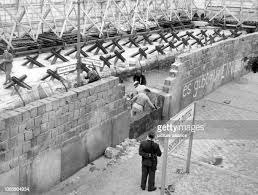|
Jim Brown Audio Player
Getting your Trinity Audio player ready...
|

Thursday, August 19th, 2021
Baton Rouge, Louisiana
THE BERLIN WALL!
There has been a lot of publicity about the tearing down of the Berlin wall. But few people know that the wall itself was constructed 60 years ago this week. The Russian puppet regime in east Germany was trying to stop the stem of so many East Germans flying to the west.
I had a personal experience of traveling to East Berlin in 1962. My application to attend Cambridge University was accepted, and I was also invited to join the U.S. track team that was touring Europe during the summer and fall of 1962. I headed to England on Icelandic Airlines (the cheapest way to get to Europe) with my track shoes, about four hundred dollars in cash, and a bundle of enthusiasm for what I hoped would be an enjoyable year abroad.
The highlight of the summer for me was being the leadoff runner on the American 400-meter relay team, where I handed off the baton to the world’s fastest human, “Bullet Bob” Hayes. He was the world record holder in the 100-yard dash. Our relay team also included Ralph Boston who was the world record holder in the broad jump and Paul Warfield who went on to have a successful professional football career with the Philadelphia Eagles. We competed several times a week in major cities throughout Europe, and we never lost a race.
Strangely enough, my track career led to the first significant political crisis I ever faced. We had a two-week break in the schedule, and the American team was going to vacation in various parts of Europe, then regroup in Bremerhaven, Germany, for our next official
A meet promoter approached me to run in East Berlin during the break. The promoter assured me that I would receive full expenses and appropriate prizes. There was no professional track in the 1960s, but the better runners could negotiate for their prize ““ a clock radio, a T.V. set, maybe a refrigerator, all of which could be cashed in after the meet.
I had never been to East Germany, and I figured if the promoter was willing to cover the expenses of a struggling student runner, why not go for it.
The Berlin Wall was still standing, and America did not recognize East Germany as a legitimate country. It was considered a Russian puppet state, and the U.S. maintained no diplomatic relations with the country. Once you crossed to the other side of the wall, you were on your own.
On the afternoon of the track meet, I crossed the border from West Berlin at Checkpoint Charlie, along with the agent who had arranged for me to run in the meet. (He also served as my interpreter.) It was an evening meet, and I was scheduled to compete in the high hurdles against an East German who was world ranked. The East Germans had built up the competition as a grudge match between our two countries and made it a point of honor for their national pride.
Our team had been competing several times a week, but the break had given me a lengthy rest from the grind of competition. I felt extra spring in my legs and anticipated a good run and victory over the East German.
The 100-meter dash was about to begin when my agent brought over an American who wanted to talk to me. He did not fully identify himself, but he said he was with the American Embassy in West Germany. He told me in strong terms that it would be completely unacceptable for me to run the high-hurdles race that was about to start. As a member of the American team, he argued, I was a representative of my government. Since America did not recognize East Germany, I would be giving tacit recognition to a country that the United States felt was illegitimate. He implied that by competing I could start an international incident; if I had any patriotism, I would get my gear and head back across the border to West Berlin immediately.
What a dilemma for a twenty-one-year-old who was simply enjoying the opportunity to travel and had no real understanding of the international consequences supposedly at stake. I wanted to run, but I certainly was not going to go against the wishes of my country. So I gathered my warm-ups and had the interpreter tell the meet promoter that I was not going to run.
As the announcement was being made that I would not compete, I headed for the locker rooms, which were located at the other end of the stadium, diagonally across the infield. Thousands of people in the stadium stood up and whistled loudly, which was their way of booing. I learned later that the announcer had told the crowd the American was afraid to compete against the East German. I was angry and disappointed, but I had enough common sense to change my clothes and get back across the border.
Many years later, I would look back on this controversy as my first political act. I guess the possibility of starting an international incident certainly qualifies as a baptism in politics. I never went to East Berlin again until after the wall itself was torn down in1989.
Peace and Justice.
Jim Brown
Jim Brown’s syndicated column appears each week in numerous newspapers throughout the nation and on websites worldwide. You can read all his past columns and see continuing updates at www.jimbrownla.com.


